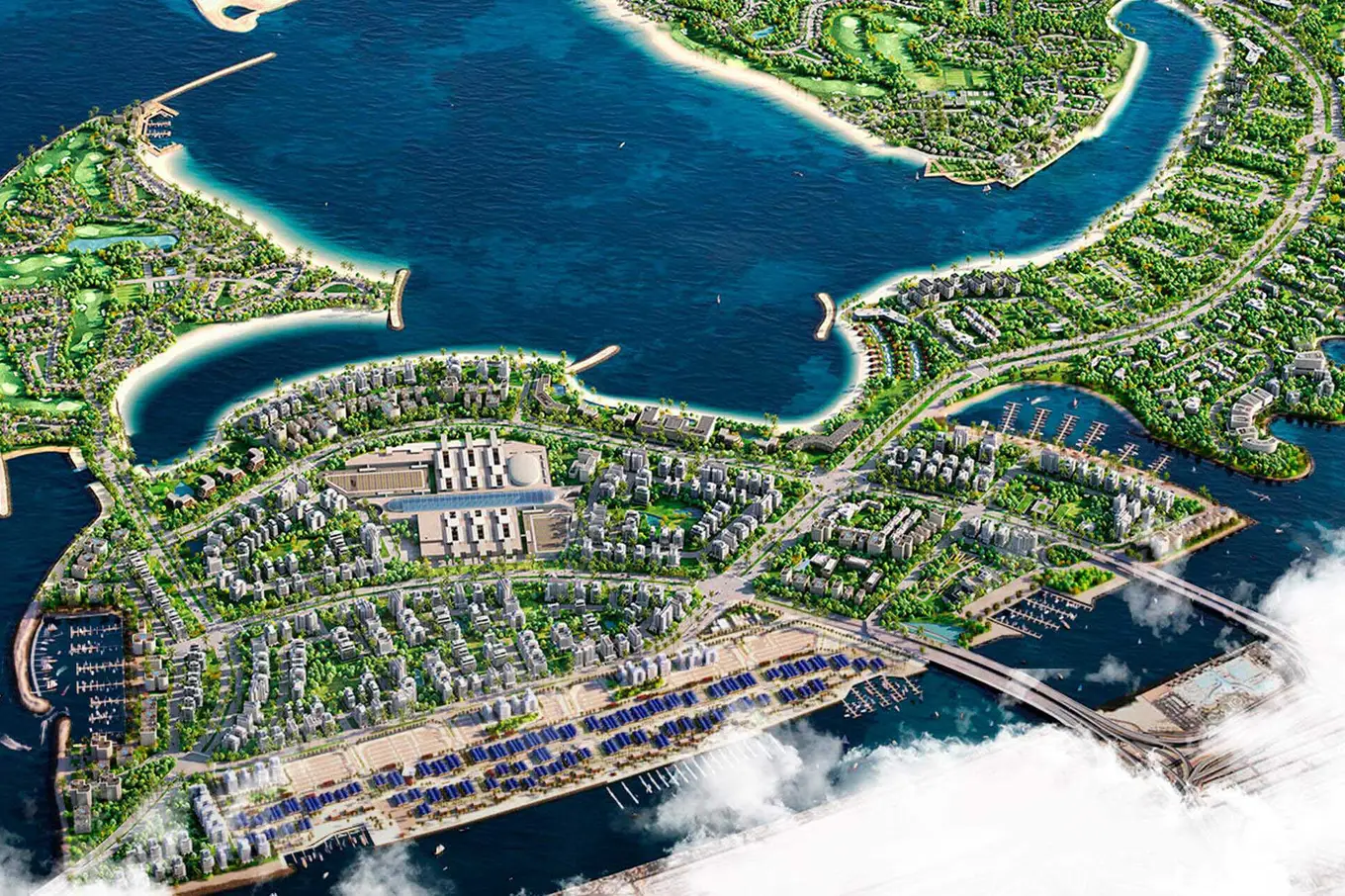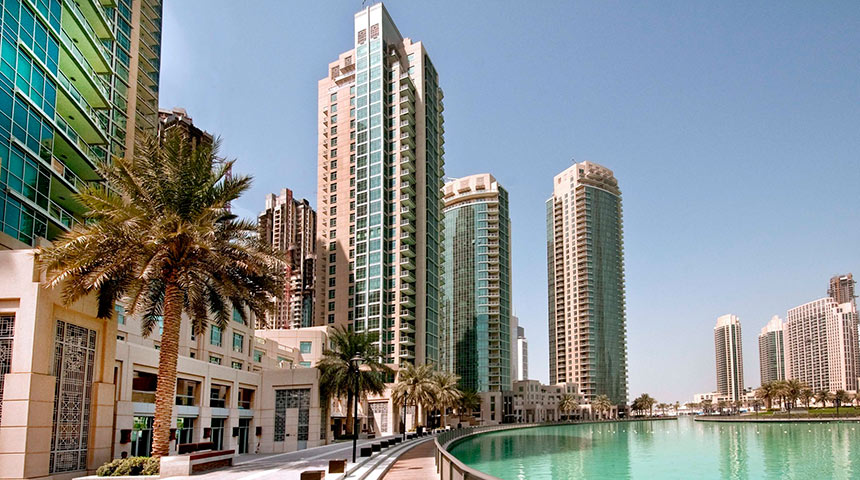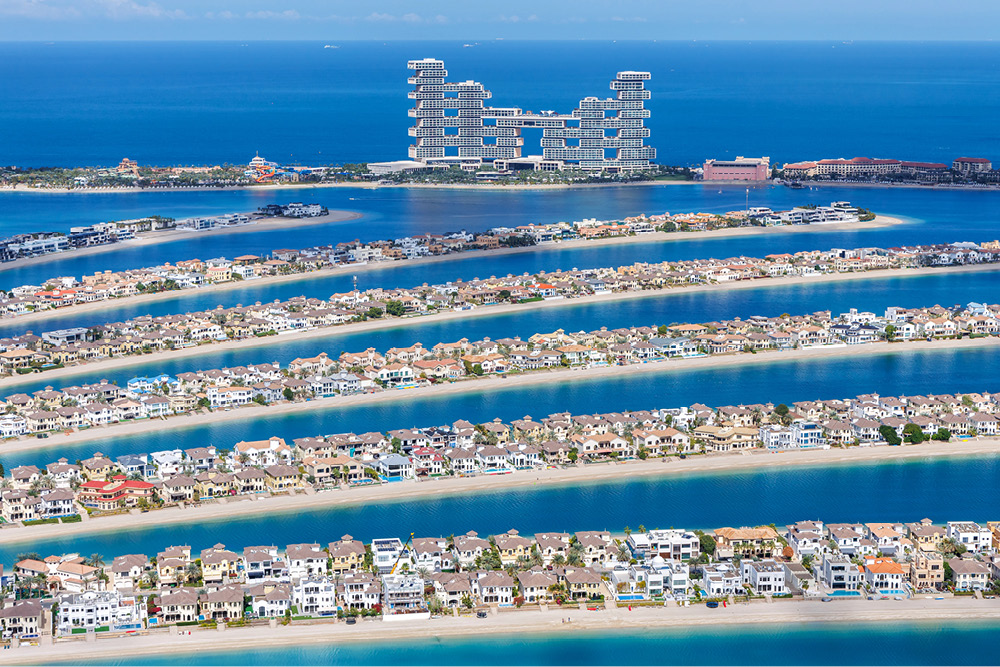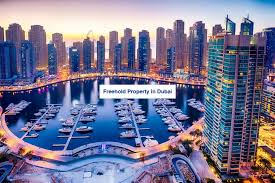Now Reading: Dubai’s Island Projects: How to Legally Minimize Real Estate Tax
-
01
Dubai’s Island Projects: How to Legally Minimize Real Estate Tax
Dubai’s Island Projects: How to Legally Minimize Real Estate Tax

Table of Contents
Imagine sipping coffee on your balcony overlooking the Arabian Gulf, the Palm Jumeirah’s iconic skyline in view, knowing you’ve legally trimmed your tax bill to keep more of your wealth. In 2025, Dubai’s island projects Palm Jumeirah, Palm Jebel Ali, and Dubai Islands are a haven for investors, offering 100% freehold ownership, a dirham pegged to the U.S. dollar for stability, and no personal income tax, capital gains tax, or annual property taxes for individuals.
With 58% of buyers from countries like the UK, India, and Russia, Dubai recorded 94,000 property transactions in the first half of 2025. Boasting 4-6% rental yields and 8-15% price appreciation, these islands outshine London (2-4%) or New York (3-4%). Properties over $545,000 qualify for a 10-year Golden Visa, while smaller units offer 2-year residency perks.
Residential purchases dodge 5% VAT, but strategic planning is key to minimizing transfer fees, developer fees, and corporate taxes. This guide shares legal tax minimization strategies for projects like Palm Jumeirah Ocean Villas, Palm Jebel Ali Coastal Villas, Dubai Islands Horizon Villas, Haven Living, and Azura Residences, helping you maximize returns.
Dubai’s Island Projects: A Tax-Light Paradise
Nestled 15-30 minutes from Dubai International Airport via Sheikh Zayed Road or water taxi, Palm Jumeirah, Palm Jebel Ali, and Dubai Islands span 50-80 kilometers of coastline, offering luxury villas, vibrant communities, and low 2-3% vacancy rates compared to 7-10% globally, driven by 25 million tourists and a 5% population surge.
Investors keep 100% of rental income ($48,000-$240,000 annually on a $1.2 million-$6 million property), versus $26,400-$144,000 elsewhere after taxes. Zero capital gains tax saves $60,000-$280,000 on a $300,000-$1 million profit, and no annual property taxes save $12,000-$120,000 yearly, unlike New York (1-2%) or London (council tax up to 2%). Residential purchases avoid 5% VAT ($60,000-$300,000), but corporate structures, transfer fees, and developer fees require savvy strategies to minimize tax exposure.
The tax-light vibe feels like a warm hug for your investments.
Strategy 1: Hold Properties Personally to Avoid Corporate Tax
Holding properties as an individual avoids the 9% corporate tax, introduced in 2023, which applies to businesses unless exempt. A company leasing a $4 million Palm Jumeirah villa yielding $160,000-$240,000 faces a 9% tax ($14,400-$21,600), reducing net income to $145,600-$218,400. Individual ownership keeps every dirham, saving $14,400-$21,600 annually.
For high-net-worth investors, this is the simplest way to sidestep corporate tax. If a corporate structure is needed for legal or financial reasons, obtain Qualified Free Zone Person (QFZP) status in areas like Dubai Multi Commodities Centre (DMCC), saving $20,400-$61,200 with setup costs of $2,000-$5,000. Small business relief waives corporate tax for revenues under $816,000 until December 31, 2026, ideal for smaller portfolios.
Owning personally feels like a direct path to tax-free wealth.
Strategy 2: Use Gift Transfers to Slash DLD Fees
The 4% Dubai Land Department (DLD) fee, typically split between buyer and seller, is a major upfront cost: $48,000 for a $1.2 million Haven Living apartment or $160,000 for a $4 million Palm Jebel Ali villa. Transferring property as a gift to family or shareholders reduces the DLD fee to 0.125%, saving $46,500-$155,000.
For example, gifting a $4 million Ocean Villas property cuts the DLD fee from $160,000 to $5,000, saving $155,000. This strategy requires legal documentation and no monetary exchange, but it’s a powerful tool for high-net-worth buyers managing family trusts or corporate holdings. Always consult a legal advisor ($1,000-$3,000) to ensure compliance.
Gift transfers feel like a clever handshake with savings.
Strategy 3: Recover VAT on Developer Fees
Residential purchases are VAT-exempt, saving $60,000-$300,000 on a $1.2 million-$6 million property, unlike commercial properties or the UK’s stamp duty (up to 12%). However, off-plan purchases, common in Palm Jebel Ali and Dubai Islands, incur 5% VAT on developer fees ($20,000-$80,000). Registering with the Federal Tax Authority (FTA) for $500-$1,000 allows recovery of these fees, refundable within 6-12 months.
For a $4 million Palm Jebel Ali villa with $40,000 in developer fees, recovering 5% VAT saves $2,000. Short-term rental operators must register for VAT if revenue exceeds $102,041, charging 5% but claiming credits on expenses like DTCM fees ($408-$816). A $2 million Azura Residences apartment yielding $80,000-$120,000 incurs $4,000-$6,000 in VAT but allows $1,000-$3,000 in credits. Non-compliance risks fines up to $13,612, so hire a tax professional ($1,000-$3,000).
VAT recovery feels like finding extra cash in your pocket.
Strategy 4: Leverage Double Taxation Treaties
Dubai’s double taxation treaties with over 130 countries prevent investors from paying taxes twice on the same income. For example, a UK investor leasing a $2 million Haven Living apartment yielding $80,000-$120,000 avoids UK income tax (up to 45%), saving $36,000-$54,000, by proving tax residency in Dubai. U.S. investors deduct depreciation ($36,364-$109,091 on a $2 million-$4 million property) and management fees ($2,400-$14,545), saving up to $36,364. Filing treaty paperwork ($500-$1,500) ensures compliance, making this a must for international investors. Always verify treaty specifics with a tax advisor to maximize savings.
Treaties feel like a global shield for your profits.
Strategy 5: Optimize Rental Strategy for Tax Efficiency
Palm Jumeirah’s tourist appeal boosts short-term rental yields by 15-20% ($12,000-$48,000 on a $2 million-$4 million property), while Dubai Islands and Palm Jebel Ali suit long-term leases for stability. Short-term rentals require DTCM registration ($408-$816) and VAT registration if revenue exceeds $102,041, charging 5% but allowing credits on expenses. A $4 million Ocean Villas property yielding $160,000-$240,000 incurs $8,000-$12,000 in VAT but allows $2,000-$5,000 in credits. Long-term leases need only Ejari registration ($54-$136), avoiding VAT unless revenue hits $102,041. A property manager ($5,000-$25,000 annually) streamlines compliance, ensuring no fines up to $136,125. Choose short-term rentals in Palm Jumeirah for higher yields or long-term leases in Dubai Islands for simplicity.
Smart rentals feel like a tailored boost to your returns.
Strategy 6: Negotiate DLD Fee Splits
Negotiating the 4% DLD fee split with the seller can halve your upfront cost. For a $2 million Azura Residences apartment, the standard $80,000 DLD fee drops to $40,000 if the seller covers half. For a $4 million Palm Jebel Ali villa, this saves $80,000 from the $160,000 fee. Off-plan projects, common in Dubai Islands, often allow fee waivers or flexible payment plans (35/65 versus Palm Jumeirah’s 60/40), easing cash flow. Work with a skilled broker ($40,000-$80,000 for a 2% fee) to negotiate terms, ensuring savings are locked in before signing.
Negotiating feels like a savvy move toward tax-light ownership.
No Annual Property Taxes: A Universal Benefit
Palm Jumeirah, Palm Jebel Ali, and Dubai Islands impose no annual property taxes, saving $12,000-$120,000 yearly on a $1.2 million-$6 million property, unlike New York (1-2%) or London (council tax up to 2%). Maintenance fees vary: $15,000-$25,000 for Palm Jumeirah’s luxury villas, $12,000-$20,000 for Palm Jebel Ali’s eco-friendly designs, and $5,000-$14,000 for Dubai Islands’ newer projects. A 5% municipality fee on rentals ($2,400-$12,000) applies, with Palm Jumeirah’s higher fees reflecting premium amenities. These low ongoing costs make tax minimization easier across all islands.
No property taxes feel like a weight lifted from your investment.
Zero Capital Gains Tax: Protect Your Profits

Zero capital gains tax lets you keep 100% of sale profits. Selling a $2 million Haven Living apartment for $2.5 million after 25% appreciation yields a $500,000 tax-free profit, saving $100,000-$140,000 compared to London (20-28%) or New York (20-37%). A $4 million Palm Jumeirah villa sold for $5 million yields a $1 million tax-free gain, saving $200,000-$280,000. Price growth varies: Palm Jumeirah at 8-12%, Palm Jebel Ali at 10-15%, and Dubai Islands at 8-12%. This universal benefit enhances tax minimization strategies.
Keeping every dirham feels like a financial high-five.
No Personal Income Tax: Boost Rental Income
No personal income tax means you keep 100% of rental income, unlike the U.S. (up to 37%) or UK (up to 45%). A $2 million Azura Residences apartment yielding $80,000-$120,000 saves $36,000-$48,000. A $4 million Palm Jebel Ali villa yielding $160,000-$240,000 saves $72,000-$96,000. Short-term rentals in Palm Jumeirah boost yields by 15-20%, adding $12,000-$48,000, while Dubai Islands’ long-term leases offer stability. This tax-free income is a cornerstone of minimization strategies.
Tax-free rentals feel like a monthly gift to your wealth.
New Tax Rule 1: Domestic Minimum Top-up Tax (DMTT)
Effective January 1, 2025, the DMTT imposes a 15% tax on multinational enterprises (MNEs) with global revenues over €750 million ($793 million). A corporate entity leasing 10 properties with $1 million in income faces a 15% tax ($150,000), reducing net income to $850,000. Individual investors and smaller entities with revenues below $816,000 are unaffected, and QFZP status avoids DMTT, saving $12,240-$61,200. This rule targets large corporations, preserving tax minimization for most buyers.
The DMTT feels like a corporate tweak, sparing individual wealth.
New Tax Rule 2: Qualifying Investment Fund (QIF) Updates
Cabinet Decision No. 34 of 2025, effective Q2 2025, refines QIF and Real Estate Investment Trust (REIT) rules. QIFs remain exempt from corporate tax if real estate income is below 10% of total income and ownership is diversified. If a QIF earns $1 million, with $200,000 from real estate, 80% ($160,000) faces 9% tax ($14,400). Restructuring costs $1,500-$4,000. Individual investors avoid these rules, while corporate investors must structure funds carefully.
QIF updates feel like a strategic puzzle for business portfolios.
Palm Jumeirah Ocean Villas: Tax-Efficient Luxury
Ocean Villas by Nakheel, set for completion in Q2 2025, offer 4-6 bedroom villas ($3 million-$6 million) with 4-6% rental yields and 8-12% price growth. A $4 million villa yields $160,000-$240,000 tax-free, saving $72,000-$96,000. Selling for $5 million yields a $1 million tax-free profit, saving $200,000-$280,000. No property taxes save $40,000-$80,000 yearly, and VAT exemption saves $200,000. Transfer costs include a 4% DLD fee ($160,000), 2% broker fee ($80,000), and title deed issuance ($136-$272). Gift transfers save $155,000. Maintenance fees are $15,000-$25,000, with a 5% municipality fee ($8,000-$12,000). QFZP saves $40,800-$61,200. U.S. investors deduct depreciation ($72,727-$109,091), saving up to $36,364. Golden Visa eligibility applies.
The beachfront elegance feels like a tax-smart masterpiece.
Palm Jebel Ali Coastal Villas: Eco-Friendly Savings
Coastal Villas by Nakheel, set for completion in Q3 2025, offer 4-6 bedroom villas ($2.72 million-$5.44 million) with 4-6% rental yields and 10-15% price growth. A $3 million villa yields $120,000-$180,000 tax-free, saving $54,000-$72,000. Selling for $3.75 million yields a $750,000 tax-free profit, saving $150,000-$210,000. No property taxes save $30,000-$60,000 yearly, and VAT exemption saves $150,000. Transfer costs include a 4% DLD fee ($108,900-$217,800), 2% broker fee ($54,450-$108,900), and title deed issuance ($136-$272). Gift transfers save $106,650-$213,300. Maintenance fees are $12,000-$20,000, with a 5% municipality fee ($6,000-$9,000). QFZP saves $30,600-$45,900. U.S. investors deduct depreciation ($54,545-$98,182), saving up to $34,091. Golden Visa eligibility applies.
The eco-friendly charm feels like a tax-efficient retreat.
Dubai Islands Horizon Villas: Modern Tax Haven
Horizon Villas by a leading developer, set for completion in Q2 2026, offer 4-6 bedroom villas ($2.72 million-$5.44 million) with 4-6% rental yields and 8-12% price growth. A $3 million villa yields $120,000-$180,000 tax-free, saving $54,000-$72,000. Selling for $3.75 million yields a $750,000 tax-free profit, saving $150,000-$210,000. No property taxes save $30,000-$60,000 yearly, and VAT exemption saves $150,000. Transfer costs include a 4% DLD fee ($108,900-$217,800), 2% broker fee ($54,450-$108,900), and title deed issuance ($136-$272). Gift transfers save $106,650-$213,300. Maintenance fees are $12,000-$20,000, with a 5% municipality fee ($6,000-$9,000). QFZP saves $30,600-$45,900. U.S. investors deduct depreciation ($54,545-$98,182), saving up to $34,091. Golden Visa eligibility applies.
The waterfront serenity feels like a modern tax-light gem.
Haven Living: Affordable Tax Efficiency
Haven Living by Metac Properties, set for completion in Q4 2025, offers 1-3 bedroom apartments ($475,750-$1.2 million) with 4-6% rental yields and 8-12% price growth. A $1.2 million apartment yields $48,000-$72,000 tax-free, saving $21,600-$28,800. Selling for $1.5 million yields a $300,000 tax-free profit, saving $60,000-$84,000. No property taxes save $12,000-$24,000 yearly, and VAT exemption saves $60,000. Transfer costs include a 4% DLD fee ($48,000), 2% broker fee ($24,000), and title deed issuance ($136-$272). Gift transfers save $46,500. Maintenance fees are $5,000-$10,000, with a 5% municipality fee ($2,400-$3,600). QFZP saves $12,240-$18,360. U.S. investors deduct depreciation ($21,818-$43,636), saving up to $17,455. Golden Visa eligibility applies for properties over $545,000.
The waterfront charm feels like a budget-friendly tax haven.
Azura Residences: Urban Tax-Free Retreat
Azura Residences by Invest Group Overseas, set for completion in Q2 2026, offers 1-4 bedroom apartments ($680,625-$2 million) with 4-6% rental yields and 8-12% price growth. A $2 million apartment yields $80,000-$120,000 tax-free, saving $36,000-$48,000. Selling for $2.5 million yields a $500,000 tax-free profit, saving $100,000-$140,000. No property taxes save $20,000-$40,000 yearly, and VAT exemption saves $100,000. Transfer costs include a 4% DLD fee ($80,000), 2% broker fee ($40,000), and title deed issuance ($136-$272). Gift transfers save $77,500. Maintenance fees are $6,000-$12,000, with a 5% municipality fee ($4,000-$6,000). QFZP saves $20,400-$30,600. U.S. investors deduct depreciation ($36,364-$72,727), saving up to $24,545. Golden Visa eligibility applies.
The urban waterfront feels like a sleek tax-free oasis.
Navigating Risks in 2025
A projected oversupply of 41,000 units may slow price growth, with Palm Jumeirah less affected due to its prestige. Mitigate by choosing trusted developers like Nakheel or Invest Group Overseas, verifying escrow compliance under the 2025 Oqood system, and targeting low-vacancy projects (2-3%). Ensure QFZP and VAT compliance to avoid fines. Palm Jumeirah’s short-term rentals leverage tourists, while Palm Jebel Ali and Dubai Islands suit long-term leases. Proximity to key hubs drives value.
Why Dubai’s Islands Are a Tax-Smart Choice
Palm Jumeirah Ocean Villas, Palm Jebel Ali Coastal Villas, Horizon Villas, Haven Living, and Azura Residences offer no personal income tax, capital gains tax, or property taxes, saving $12,000-$280,000 annually. With 4-6% yields, 8-15% price growth, and Golden Visa perks, these 2025 projects make Dubai’s islands a vibrant, tax-efficient haven for investors who use these legal strategies to minimize costs.
read more: Palm Jumeirah Tax Guide: Service Charges, Fees, and VAT Explained






















